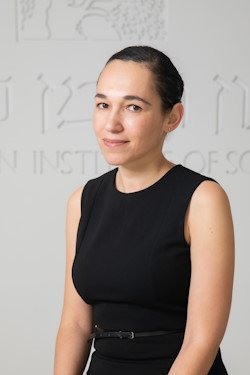Moran Shalev-Benami
2024 Israel Award Winner — Faculty

Current Position:
Senior Scientist
Institution:
Weizmann Institute of Science
Discipline:
Biochemistry & Structural Biology

Current Position:
Senior Scientist
Institution:
Weizmann Institute of Science
Discipline:
Biochemistry & Structural Biology
Recognized for: Unforeseen insights into key sensing and signaling mechanisms in the human brain. Moran Shalev-Benami, PhD, studies signaling pathways in the human brain to decipher the crucial link between the molecular and physiological levels of brain activity. She is already a leader in the field of structural biology of membrane proteins, making an impact by deciphering the architecture of multiple types of central nervous system receptors, and is leading discoveries that shed new light on how the brain regulates appetite and how light could be used to modify brain activity.
Areas of Research Interest and Expertise:
Biochemistry, structural biology, membrane protein, brain sciences, cryo-electron microscopy
Previous Positions:
BA in Molecular Biochemistry, Technion – Israel Institute of Technology
MSc in Biochemistry, Hebrew University of Jerusalem
PhD in Chemistry (Structural Biology), Technion – Israel Institute of Technology (Advisors: Timor Baasov and Noam Adir)
Postdoctoral Fellow, Weizmann Institute of Science (Advisor: Ada Yonath)
Postdoctoral Fellow, University of Michigan, USA (Advisor: Georgios Skiniotis)
Postdoctoral Fellow, Stanford University, USA (Advisor: Georgios Skiniotis)
Research Summary:
The brain is a complex, multiscale structure designed to transmit and compute information from internal and external signals to maintain physiology. Signal transduction is mediated by various receptors that reside at the cell surface and have evolved to recognize a wide variety of extracellular cues and translate them into specific outputs within the cell. Moran Shalev-Benami, PhD, seeks to understand fundamental questions about central nervous system receptors: how does their 3-dimensional (3D) structure govern the ability of individual neurons to communicate with their environment in the healthy brain, and how do disease-associated changes in these proteins lead to the onset of pathologies conditions such as obesity?
Dr. Shalev-Benami has been in the vanguard of the movement in structural biology to use cryo-electron microscopy (cryo-EM) to visualize the structure of membrane receptors at the atomic level to gain insight into their function. She recently used this approach to elucidate the activation mechanism of melanocortin receptor 4 (MC4R), a G-protein coupled receptor at the nexus of appetite and energy homeostasis and a major target for anti-obesity drugs. The structure captured by the Shalev-Benami's lab exposed an unanticipated role for calcium ions in MC4R activation and satiation signaling, which will guide the development of the next generation of anti-obesity drugs.
More recently, her research focuses on how the complex signaling systems in the brain emerged through evolutionary processes. Through these studies, her lab has also unraveled the structure and biophysical characteristics of bestrhodopsins, a novel family of unique light-sensing receptors originating from single-celled eukaryotes. This work revealed these membrane proteins' ability to assemble as supercomplexes to mediate ion channeling in a light-dependent manner, allowing future structure-based design and development of light-controlled tools for monitoring neuronal activity in living organisms.
Collectively, the research conducted in her group sheds light on the enigmatic mechanisms of action of the human brain at the molecular level, and the discoveries made through her work could not only facilitate novel drug discovery to ameliorate human disease but also contribute to development of novel research and therapeutic technologies in the field of neurobiology.
“Macromolecular machineries residing in our cells mediate every aspect of human physiology in health and disease. My lab focuses on visualizing the 3D architecture of these machines to decipher how their structures drive cellular functions.”
Key Publications:
Other Honors:
| 2021 | Krill Prize, Wolf Foundation |
| 2019 | Zuckerman Faculty Scholar, Weizmann Institute of Science |
| 2016 | UM-Israel Fellowships, University of Michigan & Weizmann Institute of Science |
| 2015 | Advancing Women in Science – the Weizmann Abroad Postdoctoral Grant, Weizmann Institute of Science |
| 2014 | Sir Charles Clore Prize for Postdoctoral Fellows, Weizmann Institute of Science |
In the Media:
Weizmann Wonder Wander – When the Heat Is On – Turn Up the Ac(4C)
SciTechDaily – The Hunger Games: Scientists Uncover the Secret of the Hunger Switch in the Brain
Haaretz – Israeli investigators deciphered the structure of the 'hunger switch' in the brain